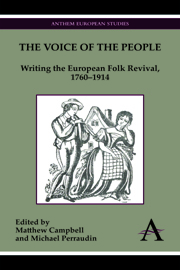Book contents
- Frontmatter
- Table of Contents
- List of Figures
- Introduction
- Chapter 1 The Impact of Ossian: Johann Gottfried Herder's Literary Legacy
- Chapter 2 On Robert Burns: Enlightenment, Mythology and the Folkloric
- Chapter 3 The Classical Form of the Nation: The Convergence of Greek and Folk Forms in Czech and Russian Literature in the 1810s
- Chapter 4 Literary Metamorphoses and the Reframing of Enchantment: The Scottish Song and Folktale Collections of R. H. Cromek, Allan Cunningham and Robert Chambers
- Chapter 5 Thomas Moore, Daniel Maclise and the New Mythology: The Origin of the Harp
- Chapter 6 The Oral Ballad and the Printed Poem in the Portuguese Romantic Movement: The Case of J. M. da Costa e Silva's Isabel ou a Heroina de Aragom
- Chapter 7 Class, Nation and the German Folk Revival: Heinrich Heine, Georg Büchner and Georg Weerth
- Chapter 8 The Estonian National Epic, Kalevipoeg: Its Sources and Inception
- Chapter 9 The Latvian Era of Folk Awakening: From Johann Gottfried Herder's Volkslieder to the Voice of an Emergent Nation
- Chapter 10 From Folklore to Folk Law: William Morris and the Popular Sources of Legal Authority
- Chapter 11 Pioneers, Friends, Rivals: Social Networks and the English Folk-Song Revival, 1889–1904
- Chapter 12 The Bosnian Vila: Folklore and Orientalism in the Fiction of Robert Michel
- Epilogue: The Persistence of Revival
- Bibliography
- Index
- List of Contributors
Chapter 2 - On Robert Burns: Enlightenment, Mythology and the Folkloric
Published online by Cambridge University Press: 05 July 2012
- Frontmatter
- Table of Contents
- List of Figures
- Introduction
- Chapter 1 The Impact of Ossian: Johann Gottfried Herder's Literary Legacy
- Chapter 2 On Robert Burns: Enlightenment, Mythology and the Folkloric
- Chapter 3 The Classical Form of the Nation: The Convergence of Greek and Folk Forms in Czech and Russian Literature in the 1810s
- Chapter 4 Literary Metamorphoses and the Reframing of Enchantment: The Scottish Song and Folktale Collections of R. H. Cromek, Allan Cunningham and Robert Chambers
- Chapter 5 Thomas Moore, Daniel Maclise and the New Mythology: The Origin of the Harp
- Chapter 6 The Oral Ballad and the Printed Poem in the Portuguese Romantic Movement: The Case of J. M. da Costa e Silva's Isabel ou a Heroina de Aragom
- Chapter 7 Class, Nation and the German Folk Revival: Heinrich Heine, Georg Büchner and Georg Weerth
- Chapter 8 The Estonian National Epic, Kalevipoeg: Its Sources and Inception
- Chapter 9 The Latvian Era of Folk Awakening: From Johann Gottfried Herder's Volkslieder to the Voice of an Emergent Nation
- Chapter 10 From Folklore to Folk Law: William Morris and the Popular Sources of Legal Authority
- Chapter 11 Pioneers, Friends, Rivals: Social Networks and the English Folk-Song Revival, 1889–1904
- Chapter 12 The Bosnian Vila: Folklore and Orientalism in the Fiction of Robert Michel
- Epilogue: The Persistence of Revival
- Bibliography
- Index
- List of Contributors
Summary
[…] what we in England designate as Popular Antiquities, or Popular Literature (though […] it […] would be most aptly described by a good Saxon compound, Folk-Lore, – the Lore of the People).
W. J. Thoms (writing under the pseudonym of Ambrose Merton) in The Athenaeum, 22 August 1846, 862–3The Scottish poet Robert Burns was born in 1759 and died in 1796. He is best known for Poems, Chiefly in the Scottish Dialect (1786), for his long comic narrative poem Tam o' Shanter (1791), and for his activity as a collector of Scottish songs. Here, considering Burns in the context of a European folk revival, it is Tam that is the subject of investigation. In what follows, there are two contexts that support the principal argument. Those are an attention to Burns's extensive activity in the field of song collection around the time of Tam o' Shanter, and an attention to his use of folkloric material in poetry prior to 1791. The two are connected, and not least by his European reception in the nineteenth century: his poetry and song was widely translated and circulated in nineteenth-century Europe, and whilst this chapter does not touch particularly on translations of Burns, of which there are some 1,000 recorded by 1899, it is perhaps there that his broader European significance lies. In terms of the folkloric, however, in Britain, his position on the transitional edge of British literary Romanticism, as it emerges out of the eighteenth and slides into the nineteenth century, is hugely important.
- Type
- Chapter
- Information
- The Voice of the PeopleWriting the European Folk Revival, 1760–1914, pp. 21 - 34Publisher: Anthem PressPrint publication year: 2012
- 2
- Cited by



